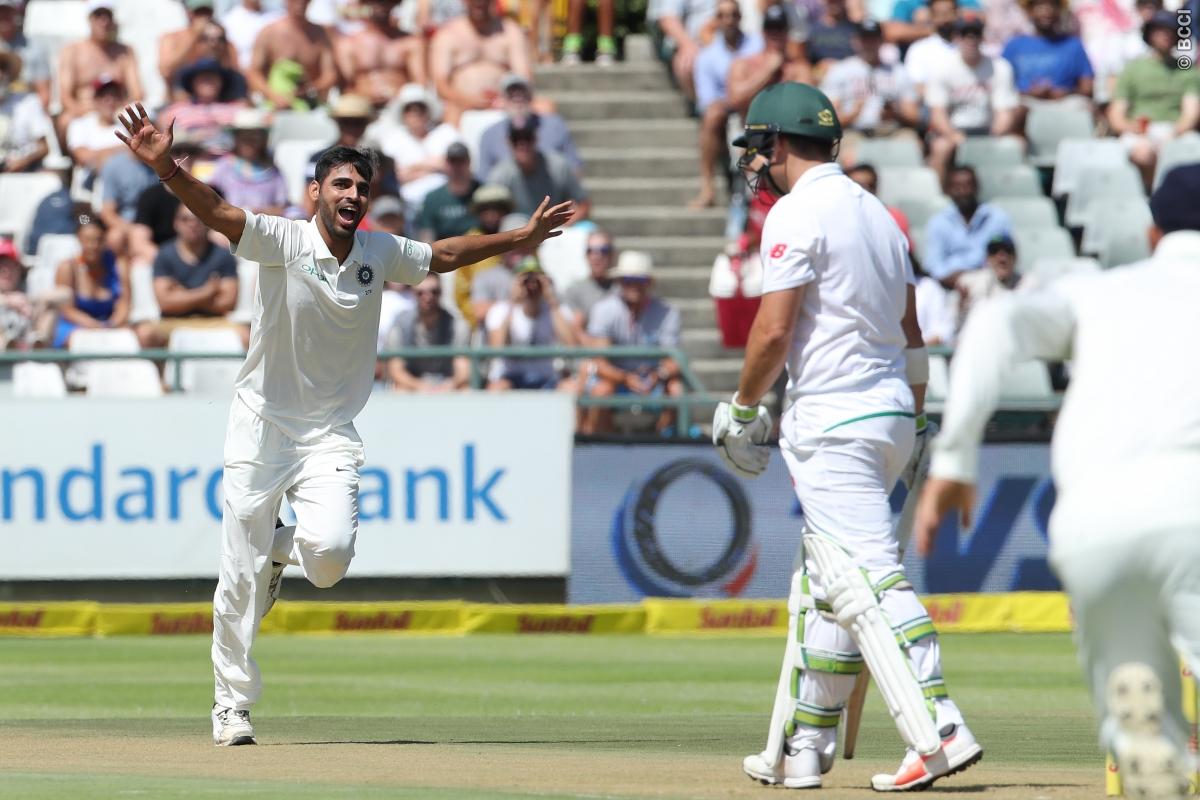India vs South Africa | Talking points from Day One of Cape Town Test
Cape Town saw a surprising performance by the South African batsmen as Bhuvneshwar Kumar ran riot with a four-wicket haul to bundle out the hosts for 286 runs in the first innings. Indian openers, however, failed to make that count and lost their wickets and the team was reduced to 28/3 in 11 overs.

Brief
Bhuvneshwar Kumar and the art of setting the batsmen up
There is a bit of Zaheer Khan to Bhuvneshwar Kumar's approach to the crease. There's an eerily similar sense of urgency to scamper through his sprint, before the arm gets into motion, a lot quicker than that of the superstar of the yore. And most importantly, the duo always try to deceive the batsmen by luring them for one type of delivery and going for another one suddenly. Bhuvneshwar showcased that ability today as he set Aiden Markram with three out swinging deliveries before deceiving with an in-swinging one.
Bhuvneshwar got three of the five balls of the third over to seam away from the right-hander and that allowed the latter to believe that the remaining ball would be away-swingers as well. The wicket ball, however, prodigiously seamed in and Markram was so unaware that he didn't have enough time to even bring his bat down and failed to protect his front foot. That can also be attributed to Bhuvneshwar’s increased pace which didn’t allow South Africa enough time and space to form a judgment.
Not only that, the Uttar Pradesh pacer took the
India’s slip woes come to the fore once again
Since the start of India's home season in 2016-17 against New Zealand, India have missed 37 catches in the slip-cordon, which doesn’t paint a good picture of the World No.1 team. India's problems accentuated since the beginning of 2012-13 when Rahul Dravid and VVS Laxman, possibly among the best slip fielders India has seen, disappeared from the scene. Now, who has been the most potent fielder in the cordon for India? Rahane. The others, Murali Vijay and Virat Kohli, are far behind him in terms of slip fielding having been highly wasteful and having dropped sitters throughout the last 2-3 years.
However, after leaving out Rahane for the series opener, Indian slip fielders needed to take more responsibility in the conditions that were on offer, where the bowlers are bound to be creating chances, an assured slip cordon would keep the bowlers fresh. But, Indian fielders hardly
Virat Kohli misjudged the pitch of the ball and couldn’t grab a catch that pitched in front of him. Although that could be discounted that it was a very difficult one to pick, it was the lack of technique that was evident. Dravid, some days ago, suggested Indian players close their stance a bit so that they would help them take the catches easily, but they continued to keep a widen stance. To make matters even worse, Shikhar Dhawan missed a simple chance at the second slip much to the dismay of Bhuvneshwar Kumar. If this continues for any longer period, nothing is going to save them from facing the South African batsmen’s wrath.
Have you ever seen a faster outfield than this?
Shaun Pollock, while doing the pitch report, made one thing clear that the wicket would not be as threatening as a normal South African wicket, but added that the wicket would behave like a
But as Jonty Rhodes marked in the broadcasting, there has never been a set pattern when it comes to outfield and pitch of Newlands. Since January 2008, teams have been bowled out for runs as low as 45, 47, 95, and 110. The wickets have also seen scores of 651, 447 for seven declared, 580 for four declared, 494 for seven declared and, in a single match 629 for six declared, and 627 for seven declared. And as Rhodes added, in all the high scoring matches, the Newlands outfield has been pretty fast and it was just that the hosts failed to make use of it.
Welcome back, ABD
Ahead of the South Africa-India series, AB de Villiers brought an end to his sabbatical from Test cricket and returned to lead the side against Zimbabwe in the first ever four-day Test due to the absence of regular skipper Faf du Plessis. But his place for the series opener against India was in doubt when the team management decided that they would go with a four-man pace attack. But, they decided to jettison Temba Bavuma who had an ordinary run during de Villiers' absence - 876 runs in 18 Tests at an average of 31, with a top score of 89.

 © BCCI
© BCCIWith a sword of Damocles hanging on his head, de Villiers made sure that he would make it count. He made his intentions clear by sending his first delivery through midwicket for a crisp boundary and even struck the brilliant Bhuvneshwar for four fours in an over. In essence, de Villiers' innings was an exhibition of how to bat on a difficult pitch. Playing only his third day of Test cricket over the last two years, he made 65 off 84 balls. Obviously, not a bad comeback to red ball cricket for Mr. 360.

Comments
Sign up or log in to your account to leave comments and reactions
0 Comments